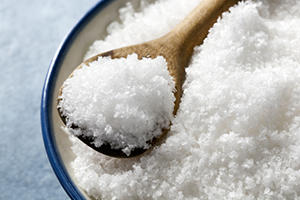 Sodium, the chief mineral in salt, is widely understood to raise blood pressure in the majority of people.
Sodium, the chief mineral in salt, is widely understood to raise blood pressure in the majority of people.
But experts have discovered that this does not apply to everyone.
Are you one of the lucky ones who can eat salt without increasing your blood pressure?
The vast majority of studies have demonstrated excessive salt intake to be a major risk factor for the development of high blood pressure. But cardiovascular specialists are increasingly starting to believe that this is not because we eat too much salt, but because we eat the wrong amount of salt for our physical makeup.
On this view, genetic and environmental influences determine how much salt each person can eat. The one-size-fits-all recommendation to eat less salt is wrong. One size does not fit all. Some people are more salt resistant, while others are more salt sensitive.
Salt sensitive people will suffer from high blood pressure if they eat too much salt, while salt resistant people will see their blood pressure rise if they eat too little salt.
Yes you heard it right. Academics at the University of Virginia have established that 15 percent of people are so salt resistant that they actually experience a rise in blood pressure when they eat little salt.
There are also many potentially fatal consequences of a sodium deficiency, such as a build-up of plaque in your arteries that makes the universal recommendation to eat less salt seems risky.
These researchers believe that there should be a test so people can discover their personal ideal daily salt intake.At this stage such a test is not yet widely available, but the above mentioned researchers at the University of Virginia, School of Medicine have taken out a patent for a test they have just developed. They ultimately envision that it will become available for use by general practitioners.
These tests are basically blood tests that search for variations of specific genes.
To be much more specific, they search for nucleotide polymorphisms (or variants) of the sodium-bicarbonate co-transporter gene and the G protein-coupled receptor kinase 4 gene that previous studies have linked with salt sensitivity. Depending on how many of these nucleotide polymorphisms you have, they rate you on a scale from salt sensitive to salt resistant and recommend your daily salt intake based on your score.
What?
Yes, this is the simplest explanation, but it is already well on its way to being incomprehensible.
In general, African-American, older people, and women are the most likely to be salt sensitive.
So is there anything you can do to make yourself more salt resistant?
Not terribly much, but some studies have tentatively concluded that you are more sensitive to salt eaten in the evening than in the afternoon, and that overweight people and diabetics are substantially more salt sensitive than others.
You can, therefore, maintain a healthy body weight through exercise and healthy dieting, refrain from eating high glycemic foods that spike your blood glucose, and refrain from eating salt in the evenings. Beyond that, it is all in your genes.
Another important point is to pick the right kind of salt. Unrefined sea salt includes fewer chemicals and more healthy minerals than the heavily processed table salt widely used.

 Overcoming IBD
Overcoming IBD Multiple Sclerosis
Multiple Sclerosis Banishing Bronchitis
Banishing Bronchitis Gum Disease Gone
Gum Disease Gone Overcoming Onychomycosis
Overcoming Onychomycosis Neuropathy No More
Neuropathy No More The Prostate Protocol
The Prostate Protocol Brain Booster
Brain Booster
 Ironbound
Ironbound
 Solution for Shingles
Solution for Shingles
 The Bone Density Solution
The Bone Density Solution
 The Ultimate Healing Protocol
The Ultimate Healing Protocol
 The Parkinson's Protocol
The Parkinson's Protocol
 The Chronic Kidney Disease Solution
The Chronic Kidney Disease Solution
 Overthrowing Anxiety
Overthrowing Anxiety The Fatty Liver Solution
The Fatty Liver Solution The Hypothyroidism Solution
The Hypothyroidism Solution
 The End of Gout
The End of Gout The Blood Pressure Program
The Blood Pressure Program
 The Oxigized Cholesterol Strategy
The Oxigized Cholesterol Strategy
 Stop Snoring And Sleep Apnea Program
Stop Snoring And Sleep Apnea Program
 The Arthritis Strategy
The Arthritis Strategy The Vertigo & Dizziness Program
The Vertigo & Dizziness Program The 3-Step Diabetes Strategy
The 3-Step Diabetes Strategy Hemorrhoids Healing Protocol
Hemorrhoids Healing Protocol The Erectile Dysfunction Master
The Erectile Dysfunction Master Weight Loss Breeze
Weight Loss Breeze The IBS Program
The IBS Program The Insomnia Program
The Insomnia Program The Migraine and Headache Program
The Migraine and Headache Program The Neck Pain Solution
The Neck Pain Solution The Menopause Solution
The Menopause Solution The Ejaculation Master
The Ejaculation Master The TMJ Solution
The TMJ Solution The Acid Reflux Solution
The Acid Reflux Solution The Fibromyalgia Solution
The Fibromyalgia Solution The Psoriasis Strategy
The Psoriasis Strategy
the term vast amount of studies tell me nothing. First who paid for the study? What results did those who paid for the study want and who did the study and how was it compiled? One the person or corporation that pays alway get the results they pay for. Next how was the test accomplished? Was it done like the ones before where they main line salt solution into rats? Most of this article left a lot be desired and worthless. So, I will eat my good untained salt and not the Government poison salt.